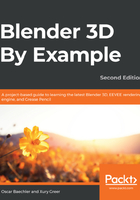
Modeling the side rails
The side rails are a fun design piece that visually ties the time machine together. For this piece, we will use some more basic modeling tools and a couple of modifiers.
As obvious as it sounds, sometimes, it's helpful to think about how an object is constructed in real life when we're thinking about how to approach modeling it in 3D. As we can see from the reference images, the side rails are just two big circular parts with the upper section removed, so that's how we'll model them!
- Go to the right-side view.
- Place the 3D Cursor as close to the center of the circular side rail as you can (see the following screenshot).
- Bring up the Add menu.
- Choose Mesh | Cylinder.
- Set Vertices to 64.
- Set Radius to 1.35 m.
- Set Depth to 0.3 m.
- Set Cap Fill Type to Nothing.
- Rename the circle SideRail.
That's a good start. Now, we can rotate and move it into position until it aligns with the reference images. Toggle between the front, back, and side views to check the alignment from all three angles. Rotate and move the side rail as needed:

Your numbers may vary, but if you'd like to perfectly match our example, you can copy the following numbers into the object properties for the side rail object:
- Location X: 0.836 m
- Location Y: 0.195 m
- Location Z: 1.585 m
- Rotation X: -4
- Rotation Y: 54
- Rotation Z: -13
Alright, that's looking good from all angles! Now, let's give it a little thickness:
- Tab into Edit Mode.
- Press 3 to switch to Face Select mode.
- Press the A hotkey to select all of the faces.
- Click and hold down the mouse button on the Extrude Region tool to expose the list of similar extrude tools.
- Choose the Extrude Along Normals tool from the list.
- Click and drag to extrude to about 0.13 m (type .13 while using the tool):

Good. It may be hard to see, but the reference of the side rail has a little lip on the lower outer part of the rim. Let's add that now:
- Use the Loop Cut tool or the Ctrl + R hotkey to cut a single new edge loop through the length of the cylinder.
- Press 3 to switch back to Face Select mode.
- Hold the Alt key and click to select the lower of the two face loops.
- Use the Extrude Along Normals tool again to extrude out to about 0.05 m:

It's subtle, but little details like this will make the end result a bit flashier! Now, all that's left are the modifiers. When we made the armrests in the previous chapter, we used the mirror modifier. We're going to do that again, but this time, we will use a Mirror Object so that the side rail can mirror across the middle of the time machine instead of around its own center point:
- Tab into Object Mode.
- Go to the Modifiers tab in the Properties panel.
- Click Add Modifier and add a mirror modifier.
- Click on the eyedropper icon in the Mirror Object field.
- Use the eyedropper to pick the Base object in the viewport:

Bam! Now, we've got two rings. We just need to lop off the top of them and we'll be done. For that, we will use a new type of modifier: Boolean. The Boolean modifier will let us remove parts of an object where it intersects with another. So, first, let's add an object that we can use to subtract from the rails:
- Go to the right-side view.
- Bring up the Add menu.
- Choose Mesh | Cylinder.
- Set Vertices to 32.
- Set Radius to 1.35 m.
- Set Depth to 4 m.
- Set Cap Fill Type to Ngon.
- Set Location X to 0 m
- Set Location Y to -0.05 m
- Set Location Z to 2.4 m
- Set Rotation X to 0.
- Set Rotation Y to 90.
- Set Rotation Z to 0.
- Rename the circle SideRail_Boolean:

Good. Although it looks like we've got a big barrel blocking the view of our time machine, we can use a Boolean operation to carve away the intersecting geometry.
Now, let's hide the cylinder and use the Boolean modifier to cut a hole in the side rail:
- While the new cylinder is still selected, press the H hotkey to hide it.
- Select the SideRail object.
- Go to the Modifiers tab.
- Click the Add Modifier button.
- Choose Boolean from the Generate column.
- The title will be red because we need to pick an object to perform the Boolean operation; click on the Object field.
- Scroll through the list until you find the SideRail_Boolean object (you can also start typing in the name of the object and it will appear in the list):

And we're done! Now, all we need is the front housing and the rear assembly. The rear assembly can be made with a familiar workflow: box modeling.